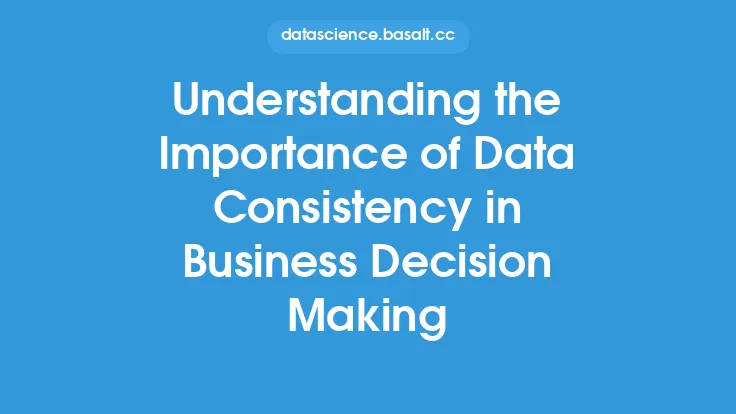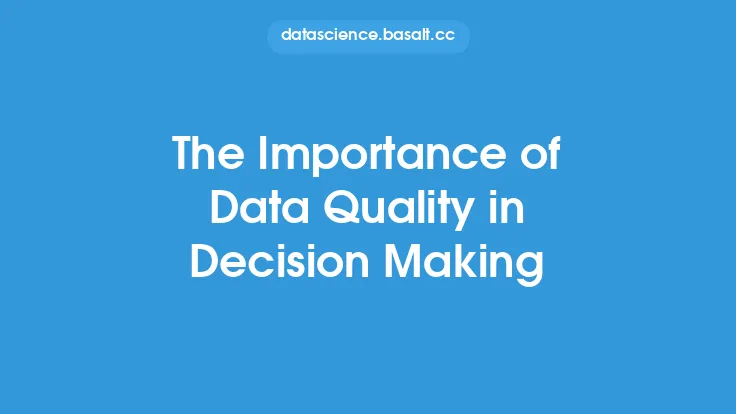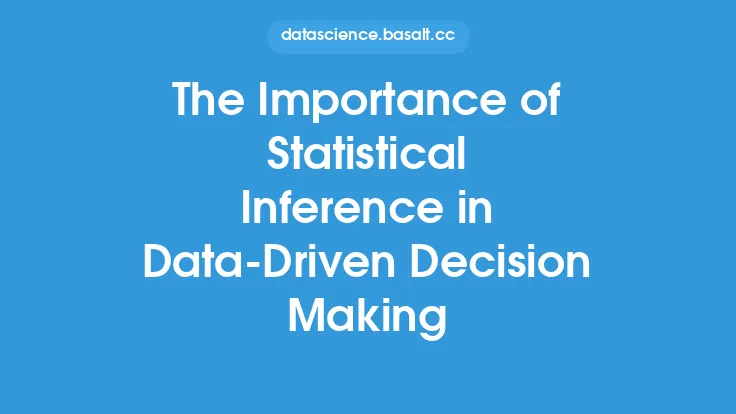In today's data-driven business landscape, organizations rely heavily on data to inform their decision-making processes. The accuracy of this data is paramount, as it directly impacts the effectiveness and reliability of business decisions. Data accuracy refers to the degree to which data reflects the true values or characteristics of the objects, events, or concepts it represents. Ensuring data accuracy is crucial for businesses to avoid making decisions based on flawed or misleading information, which can have far-reaching consequences.
Introduction to Data Accuracy
Data accuracy is a fundamental aspect of data quality, which encompasses a range of dimensions, including completeness, consistency, validity, and reliability. Accurate data is essential for businesses to develop a clear understanding of their operations, customers, and market trends. It enables organizations to identify areas of improvement, optimize their processes, and make informed decisions about investments, resource allocation, and strategic planning. Inaccurate data, on the other hand, can lead to incorrect conclusions, poor decision-making, and ultimately, negative business outcomes.
The Benefits of Accurate Data
Accurate data offers numerous benefits to businesses, including improved decision-making, enhanced operational efficiency, and increased competitiveness. With accurate data, organizations can develop a more nuanced understanding of their customers' needs and preferences, allowing them to tailor their products and services to meet these demands. Accurate data also enables businesses to monitor their performance, identify areas of improvement, and track the effectiveness of their strategies. Furthermore, accurate data can help organizations to reduce costs, minimize risks, and optimize their resources, leading to improved profitability and sustainability.
The Consequences of Inaccurate Data
Inaccurate data can have severe consequences for businesses, including financial losses, reputational damage, and decreased competitiveness. When organizations rely on inaccurate data, they risk making decisions that are not grounded in reality, which can lead to poor investments, inefficient resource allocation, and ineffective strategic planning. Inaccurate data can also lead to compliance issues, as businesses may fail to meet regulatory requirements or industry standards. Moreover, inaccurate data can damage an organization's reputation, erode customer trust, and ultimately, impact its bottom line.
Data Accuracy in Business Decision Making
Data accuracy plays a critical role in business decision making, as it directly impacts the reliability and effectiveness of decisions. When data is accurate, businesses can develop a clear understanding of their operations, customers, and market trends, enabling them to make informed decisions about investments, resource allocation, and strategic planning. Accurate data also enables organizations to identify areas of improvement, optimize their processes, and monitor their performance. In contrast, inaccurate data can lead to poor decision-making, as businesses may rely on flawed or misleading information. To ensure data accuracy, organizations must implement robust data management practices, including data validation, data cleansing, and data normalization.
Data Validation and Verification
Data validation and verification are essential processes for ensuring data accuracy. Data validation involves checking data for errors, inconsistencies, and inaccuracies, while data verification involves confirming the accuracy of data against external sources or reference data. These processes help to ensure that data is accurate, complete, and consistent, reducing the risk of errors and inaccuracies. Organizations can use various techniques, including data profiling, data quality metrics, and data certification, to validate and verify their data. By implementing these processes, businesses can ensure that their data is reliable, trustworthy, and accurate, supporting informed decision-making and effective business operations.
Data Governance and Quality
Data governance and quality are critical components of ensuring data accuracy. Data governance refers to the policies, procedures, and standards that organizations use to manage their data, while data quality refers to the processes and techniques used to ensure data accuracy, completeness, and consistency. Effective data governance and quality practices enable organizations to ensure that their data is accurate, reliable, and trustworthy, supporting informed decision-making and effective business operations. By implementing robust data governance and quality practices, businesses can reduce the risk of data errors, improve data accuracy, and increase the reliability of their data.
Technical Aspects of Data Accuracy
From a technical perspective, data accuracy is influenced by various factors, including data storage, data processing, and data transmission. Data storage refers to the way in which data is stored and managed, while data processing refers to the way in which data is transformed, aggregated, and analyzed. Data transmission refers to the way in which data is transferred between systems, applications, and organizations. To ensure data accuracy, organizations must implement robust technical controls, including data encryption, data backup, and data recovery. Additionally, businesses must use reliable and trustworthy data sources, implement data validation and verification processes, and use data quality metrics to monitor and evaluate data accuracy.
Best Practices for Ensuring Data Accuracy
To ensure data accuracy, organizations should implement various best practices, including data validation, data verification, and data normalization. Data validation involves checking data for errors, inconsistencies, and inaccuracies, while data verification involves confirming the accuracy of data against external sources or reference data. Data normalization involves transforming data into a consistent format, reducing the risk of errors and inaccuracies. Additionally, businesses should implement robust data governance and quality practices, including data certification, data profiling, and data quality metrics. By implementing these best practices, organizations can ensure that their data is accurate, reliable, and trustworthy, supporting informed decision-making and effective business operations.
Conclusion
In conclusion, data accuracy is a critical aspect of business decision making, as it directly impacts the effectiveness and reliability of decisions. Organizations must implement robust data management practices, including data validation, data verification, and data normalization, to ensure data accuracy. By implementing these practices, businesses can reduce the risk of data errors, improve data accuracy, and increase the reliability of their data. Additionally, organizations should implement effective data governance and quality practices, including data certification, data profiling, and data quality metrics, to ensure that their data is accurate, reliable, and trustworthy. By prioritizing data accuracy, businesses can make informed decisions, optimize their operations, and drive success in today's data-driven business landscape.





